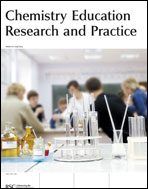Revisiting the chemistry triplet: drawing upon the nature of chemical knowledge and the psychology of learning to inform chemistry education
Abstract
Much scholarship in chemical education draws upon the model of there being three ‘levels’ at which the teaching and learning of chemistry operates, a notion which is often represented graphically in terms of a triangle with the apices labelled as macroscopic, submicroscopic and symbolic. This model was proposed by Johnstone who argued that chemistry education needs to take into account ideas deriving from psychological research on cognition about how information is processed in learning. Johnstone's model, or the ‘chemistry triplet’, has been widely taken-up in chemistry education, but has also been developed and reconceptualised in diverse ways such that there is no canonical form generally adopted in the community. Three decades on from the introduction of Johnstone's model of the three levels, the present perspective article revisits both the analysis of chemical knowledge itself, and key ideas from the learning sciences that can offer insights into how to best teach the macroscopic, submicroscopic and symbolic aspects of chemical knowledge.

 Please wait while we load your content...
Please wait while we load your content...